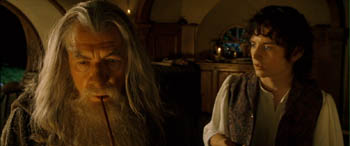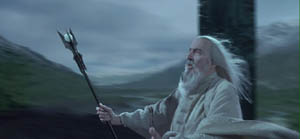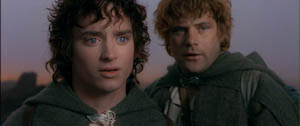|
You could mark on your calendar every time Hollywood made a good decision and never be worried that the thing would get too cluttered up. This is one of the rare exceptions, for which I'm most grateful. 
I was ecstatic when I heard that there was finally going to be a big-screen, live-action adaptation of J. R. R. Tolkien's epic fantasy The Lord of the Rings, largely because the point at which I learned this was the same point at which I learned that Peter Jackson was going to be directing it. There had been a few previous attempts to adapt Tolkien's works, which had achieved varying degrees of failure. Okay, the Rankin/Bass version of The Hobbit was actually pretty decent. But that was about it. Jackson I trusted to get it right; despite a rather lowbrow previous track record, he had also directed the exceptional Heavenly Creatures, which he and collaborator Fran Walsh had adapted from a real-life murder case with a meticulous eye for detail and accuracy that would seriously benefit a project as detail-intense as a Lord of the Rings adaptation would need to be. And if his other efforts seemed less obviously indicative of his abilities, it remained that while, say, Dead Alive (a.k.a. Braindead) had been a gross-out zombie splatter flick, it was the ultimate gross-out zombie splatter flick. This was a man who didn't settle for half-assed, an important thing to consider when realizing that the main villain in this piece is just an eye, which could've come across as somewhat less than intimidating in the hands of a less imaginative director. I'm specifically reviewing the Extended Edition because I, like many other fans of these films, consider it to be the "finished" version, one which could be produced without the irksome constraints of the theatrical release format. Of course, even at three-and-a-half hours, it couldn't fit the entirety of the novel within its course, but in a larger sense, it wasn't really necessary. It got all of the important details, and enough of the nuances of setting and character that the omissions are scarcely noticable. To cut through all the questions of adapting such a long and detailed work to film, the fact is that what's truly important, as is the case with any film, is whether or not the film is any good, rather than whether or not it's a perfect echo of a prior piece of work. Films have a different language than books, and if you prefer the written version, then there's nothing to stop you from sticking with it. Certain compromises were inevitable, such as the fact that Frodo could no longer be a fifty year-old character. The convolutions necessary to have a forty-minute stretch with a young Frodo and then either replace the actor you've come to recognize with an older actor, or force the guy to wear age makeup throughout the remainder of the production, would've been ludicrous to contemplate. The somewhat languid, easygoing pace of the book had to get a kick in the seat, too, along with giving the story a more linear structure. If a kick in the seat is what it got, it's also what it gives back. It would be safe to say that I was absolutely floored by my first viewing of The Fellowship of the Ring, an experience unlike any I'd had since the original Star Wars trilogy. This is filmmaking at its most exciting; an entire new world realized with near-total believability. The action was exciting. The drama was engaging. The characters were beautifully realized. The story, which had always been good, stayed good. I left the theater that night with a reaffirmation that huge, epic drama was still within the grasp of at least some filmmakers.  If there's actually a member of the human race out there who still doesn't know what the story is about, let say very briefly that it's a heroic quest to destroy the One Ring before it can be reclaimed by the believed-defeated Dark Lord Sauron, whose power will return in full if he should succeed. The books never make clear what exactly the ring will do or what power it will confer to a claimant, a vagary which the films have wisely retained-how often has a long-sought magical object turned out to simply shoot a ray or something else equally as dull? At its most basic, the ring represents power over others and the world in general, and manifests its power with a kind of whispering, needling temptation to those around it, saying "take me as yours, and all you wish can be true." Tolkien himself had a somewhat negative and cynical view of life, and possessed no illusions about the capacity for seemingly normal people to commit evil acts; hence, the greatest danger of the ring is to corrupt and subvert the best of intentions to its own will. As the story progresses, it begins to beat on the will of our hero Frodo ever harder, trying to turn him from his mission and manuever itself back into its master's hands. Changes from the book range in severity, chief among the major ones being the greater role given to the character of Arwen Evenstar, who received relatively little attention in the novel. With a choice of either removing the character (as Ralph Bakshi had previously done) or enhancing her role, Jackson chose the latter-wisely-and gave her the role previously filled in the book by Glorfindel, a character who never really appears again. A good chunk of the Hobbits' journey to the Elvish city of Rivendell fell by the wayside, as well, including the meeting with Tom Bombadil, another character who never shows up again (although an echo of part of this missing section would be seen in the second film.) Other changes were more subtle: the film viewer begins the story fully knowing the history of Sauron and the ring, which the book reader did not. The evil wizard Saruman appeared in only one scene in the book, and in flashback, no less, but as performed by the legendary Christopher Lee, he practically takes over the film during numerous cutaways to his schemes in progress and his attempts to waylay the heroes as they attempt to cross the Misty Mountains (a bit which co-screenwriter Philippa Boyens, on the commentary track, bizarrely seems to recall happening in the book, which it simply doesn't). King-to-be Aragorn is much less sure of his destiny as the future ruler of the kingdom of Gondor than his book version, who had been anxiously anticipating reclaiming his birthright for many long years. And the film includes the first chapter of the second book in the scope of its narrative, as well, which was also wise; starting a film with "The Departure of Boromir" would've been rather nonsensical. 
That said, there's more similarity here than there is difference. Much of the dialogue is drawn very closely from the book, though there's some inevitable paring-down. Tolkien loved to write long, rambling dialogues; hell, one could probably make an entire film out of The Council of Elrond if they kept the sequence uncut. But the essence and thematic content remain unquestionably Tolkein's; if Gandalf's speech about the value of pity and deciding what to do with the time one has was moved to much later in the story, it still conveys the author's words and beliefs. If there's one generalized difference between book and film, it's in the area of intensity. There's more action to be had in the film, more close calls with our heroes, and more of a sense of psychological pressure in scenes such as the stay at Lothlorien, which was more simply idyllic in the novel, but centers more upon the potential threat of the ring and its power in the film. (It's also a scene which benefited greatly in the Extended Edition, which restored many of the favorite moments from the book, and doubled the scene's length from the theatrical cut, which had felt a tad rushed-if a three-hour film can possibly feel rushed at all.) I honestly can find nothing to complain about here, and I'm usually rather an expert at complaining. The cast is excellent, the adaptation is true to the source, the directing is magnificent, and the effects work is top-notch, with modern CG effects (and good ones, at that; witness that Balrog!) sharing screen time with some of the best miniature work ever and old-fashioned, in-camera forced-perspective tricks. I once feared that the fact that I was no longer twelve years old would mean that I was no longer able to be truly wowed by a film-going experience any more, and I can happily say I've been proven wrong. This self-taught filmmaker from New Zealand has seriously raised the bar where film epics are concerned, and it will be interesting to see whether or not the current breed of Hollywood zombies will take a few cues and wise up before releasing more Waterworlds, Batman and Robins, and Godzillas upon the public. For the sake of all those hours of our lives we might potentially waste otherwise, let's hope so. -review by Matt Murray
|
|
||||||||